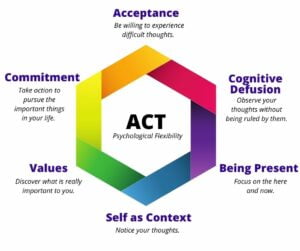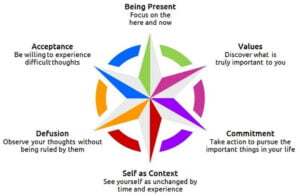Acceptance and Commitment Therapy (ACT) is a therapeutic approach developed by Steven C. Hayes over the course of over 25 years of work. ACT is an integrative approach to behavioral change, drawing on aspects of cognitive-behavioral therapy, dialectic behavior therapy, Zen Buddhism, and Eastern philosophy.
Contents
- 1 What Is Acceptance Commitment Therapy (ACT)?
- 2 Benefits Of Acceptance Commitment Therapy ACT
- 3 Who Should Get Acceptance Commitment Therapy?
- 4 How To Get Started With ACT?
- 5 Drawbacks Of Acceptance Commitment Therapy
- 6 What Can I Expect When Using ACT?
- 7 Books For ACT
- 8 Difference Between ACT & Other Therapies
- 9 ACT and Mindfulness
- 10 What ACT Acceptance Commitment Therapy Is Not?
- 11 Who Offers Acceptance Commitment Therapy?
- 12 Conclusion
What Is Acceptance Commitment Therapy (ACT)?
 ACT is the only psychotherapy with randomized controlled clinical trials supporting its effectiveness in treating depression, anxiety, PTSD, and many other psychological problems. ACT has shown positive results when used for people who are depressed after completing an 8-week course in Mindfulness-Based Cognitive Therapy. The reason that ACT has been proven to work is that it targets the brain networks involved in self-control and attention regulation.
ACT is the only psychotherapy with randomized controlled clinical trials supporting its effectiveness in treating depression, anxiety, PTSD, and many other psychological problems. ACT has shown positive results when used for people who are depressed after completing an 8-week course in Mindfulness-Based Cognitive Therapy. The reason that ACT has been proven to work is that it targets the brain networks involved in self-control and attention regulation.
The core principles of ACT can be summarized as follows:
Create willingness to experience the full range of your thoughts, emotions, physical sensations, impulses, memories, and situations in life; Identity what you truly care about; Devise a life path that reflects this core most authentically; Act in accordance with your values.
- Acceptance: The essence of ACT, accept what is difficult to change and commit to changing what you can.
- Cognitive defusion: Seeing thoughts as the products of your brain rather than facts or truths
- Contact with the present moment: Being aware of what is happening in the here and now. Noticing your pain without being overwhelmed by it.
- Acceptance, mindfulness, and values work together to clear space for effective action.
- Forgiveness: Let go of the past so that you have a chance for a different future.
- Values: Use your disappointments as compass points to guide your life. Create a satisfying and meaningful life by engaging in the actions, thoughts, and feelings that are important to you.
- Mindfulness: present moment awareness of what is occurring inside oneself without reacting to it.
Benefits Of Acceptance Commitment Therapy ACT
When people think of therapy, they often think of traditional talk therapy in which the therapist and client sit across from each other in a quiet room and discuss the client’s problems. While this is one type of therapy, there are many others that are available, such as acceptance commitment therapy (ACT). ACT is a type of cognitive-behavioral therapy that helps people to deal with difficult life problems by teaching them how to accept their thoughts and feelings. It has been shown to be effective for a wide variety of clinical problems, including-

- Depression
- Anxiety
- Eating disorders
- Bipolar disorder
- Schizophrenia
- Chronic pain
- PTSD
ACT is an effective treatment for many people who have found traditional therapy to be ineffective. For example, ACT has been shown to help individuals struggling with PTSD after exposure to war or natural disasters. This type of therapy is important for helping these individuals learn how to accept their experiences and move on in a healthy manner. By learning how to accept their thoughts and feelings, individuals can begin to live a more authentic life.
This type of therapy can help people to:
- Decrease avoidance of difficult thoughts and feelings
- Develop a sense of psychological flexibility
- Increase contact with the present moment
- Take action in line with their values
- Decrease rumination and worry
- Experience less anxiety, depression, and stress
Who Should Get Acceptance Commitment Therapy?

ACT is usually used for people who have problems with anxiety or fear, but can also be useful for people who wish to manage pain, stress, depression, relationships, stress at work, procrastination, and many more. ACT can also be used in individual therapy, group therapy, and a self-help format. People who typically benefit from this type of therapy are typically clients with moderate to severe psychological problems (e.g., anxiety, depression) who desire change but have not had success with traditional therapies or patients for whom these approaches are contraindicated.
There is a growing body of research that supports the use of ACT for a variety of mental health problems, including anxiety, depression, addiction, post-traumatic stress disorder (PTSD), and chronic pain. In fact, a recent study found that ACT may be as effective as medication for treating some forms of depression.
ACT has also been shown to be helpful for people who are not currently experiencing any psychological problems. For example, a study of college students found that those who participated in the ACT had better mental health and well-being than those who did not.
The principles and techniques of ACT can be applied to any area of life, including work, relationships, and personal goals.
Although research has shown that ACT can be effective for many populations under a wide range of circumstances. It is still fairly new compared to other types of psychotherapy. Many studies have looked at the effectiveness of ACT as an alternative or addition to traditional therapies like cognitive behavioral therapy (CBT). However, more research into the long-term benefits and risks of ACT is needed.
How To Get Started With ACT?
ACT can be used in individual therapy, group therapy, and self-help format. If you are interested in trying it out, there are a few things you can do: -Read about it. There are a number of books and articles on the ACT that can give you a good overview of the approach.
-Watch videos of ACT in action. There are a number of good ones out there that can give you a sense of how the therapy works.
-Attend an introductory workshop or seminar. This is a great way to learn about the basics of ACT and try it out in a group setting.
-Talk to someone who has experience with ACT. If you know someone who has used ACT, ask them about their experience and what they thought of it.
-Talk to a therapist who provides acceptance commitment therapy ACT. This is probably the best way to find out if ACT is right for you.
Drawbacks Of Acceptance Commitment Therapy
the potential drawback of using this therapy is that some people may find it difficult to accept their thoughts and feelings. Another potential drawback is that the therapy may require a significant amount of effort and time to be effective. potential drawbacks to this type of therapy are:

- ACT is an integrative approach some people may find difficult to accept their thoughts and feelings.
- The therapy may require a significant amount of effort and time to be effective.
- It requires motivation and effort
- The therapist needs to be trained in the ACT model
- It is not effective for everyone
What Can I Expect When Using ACT?
ACT has some proven results for some people, but not all. If you are willing to engage in the therapy with an open mind and try out things that will feel uncomfortable you can expect good results, if not you can expect limited results or none.
ACT has been shown to be effective for a wide variety of clinical problems including depression, anxiety disorders, eating disorders, bipolar disorder, schizophrenia. ACT has found use in schools and prisons for behavior management. It can also help individuals struggling with post-traumatic stress disorder (PTSD) after exposure to war or natural disasters. Finally, ACT is used in the treatment of individuals with chronic pain by helping them adapt their lives so that they are able to be engaged in what is really important.
ACT has been effective for many individuals who have found traditional psychotherapy useless.
Books For ACT
ACT provides an alternative approach for coping with emotions and thoughts, which is to observe them passively, without interpretation or judgment. This way of coping is consistent with mindfulness practice. These books are a great introduction to how ACT works and will give you ideas on how to apply it within your own life. However, the best books to read would be:
- The Happiness Trap
- How To Stop Struggling and Start Living
- A Guide To ACT by Dr. Russ Harris
- Get Out of Your Mind and Into Your Life
- The New Acceptance and Commitment Therapy by Steven C Hayes & Richard E. Baer
- You Are Not Your Brains
- The 4-Step Solution for Changing Bad Habits
- Ending Unhappiness, and Living a Better Life by Nancy Albury
These are some good books that depict acceptance commitment therapy.
Difference Between ACT & Other Therapies
 While the core principle of ACT is Acceptance, it also includes 2 additional components. These are Commitment (to acting differently) and Valuing (what you want to do). The main focus in the ACT is on doing something about what bothers you rather than ruminating or analyzing it to death. Look at it this way: You can consider a mosquito near you or kill it. The difference between these two is the focus of the mind. Ruminating and accepting both takes you in circles… i.e in your head (the “m” in the ACT). Doing and valuing take you somewhere outside of yourself, be it killing a mosquito or chasing your dreams.
While the core principle of ACT is Acceptance, it also includes 2 additional components. These are Commitment (to acting differently) and Valuing (what you want to do). The main focus in the ACT is on doing something about what bothers you rather than ruminating or analyzing it to death. Look at it this way: You can consider a mosquito near you or kill it. The difference between these two is the focus of the mind. Ruminating and accepting both takes you in circles… i.e in your head (the “m” in the ACT). Doing and valuing take you somewhere outside of yourself, be it killing a mosquito or chasing your dreams.
ACT is becoming more and more popular as a treatment approach, but it’s still not as widely known as therapies such as cognitive-behavioral therapy (CBT) or dialectical behavioral therapy (DBT). If you’re considering seeking out help from a therapist, it’s important to ask about their experience with the ACT and whether they are familiar with the approach.
ACT and Mindfulness
ACT is a mindfulness-contextualized therapy. This means that it brings mindfulness practices into the context of values-based living in order to help people live richer, more satisfying lives. It involves exercises ranging from 10 minutes per day to 1 hour or more per week. And it can help solve difficult life problems such as relationships, career direction, and existential concerns.
The key difference between mindfulness and ACT is that mindfulness is a practice that can be done on one’s own, while ACT requires the help of a trained therapist. However, both approaches share the common goal of helping people to become more aware of their thoughts and feelings and to live more fully in the present moment.
ACT incorporates some mindfulness practices to help people develop psychological flexibility. But it does not exclusively focus on formal meditation and Eastern philosophy. Rather, ACT emphasizes the importance of taking action that is consistent with personal values in order to live a more meaningful and rewarding life that also reduces stress and anxiety.
What ACT Acceptance Commitment Therapy Is Not?
ACT is not a self-help or New Age approach to spirituality than, nor is it particularly religious. It does not involve focusing on the present moment, the past, or the future.
ACT recognizes that thoughts are natural events of the mind and are ‘mental phenomena’ rather than ‘truths’. For example, a client may state, “My boss is going to fire me”, or “my relationship with my wife is over”. In the ACT this kind of thinking is normal, such as feeling sad when hearing such events. The theory says that thoughts and feelings do not require a reaction or correction. Rather are normal psychological events that come and go much like physical sensations.
ACT is not about positive thinking or the “power of positive thinking” in the traditional sense. Instead, it teaches individuals to accept what comes up (e.g., sadness, anxiety) without trying to immediately change their thoughts or feelings.
The modern roots of ACT can be traced back to ancient Greek Stoic philosophers who believed that the only way to live life happily was through acceptance rather than change. The concept found its place in early Zen Buddhism and early Christian theology.
Who Offers Acceptance Commitment Therapy?

Various practitioners, including psychologists, psychiatrists, psychotherapists, counselors, social workers, and mental health nurses offer Acceptance commitment therapy (ACT). The terms “psychiatrist” and “psychologist” often interchangeably refer to medical practitioners who offer therapy for mental or emotional problems. Other than counseling psychologists or clinical social workers.
ACT is also offered by trainees who are typically supervised by a qualified ACT therapist. There is no one way to learn ACT, and many therapists develop their own style over time. However, all ACT therapists share a common framework that includes the six core processes of acceptance, cognitive defusion, mindfulness, contact with the present moment, self as context, and values.
ACT works on the principle that psychological problems are the result of attempts to avoid or control painful thoughts and feelings. These attempts cause people to become stuck in patterns of avoidance and struggle, which leads to increased suffering. ACT therapy helps clients learn to accept their thoughts and feelings rather than fight against them. This acceptance allows them to change their relationship with these thoughts and feelings, which can lessen the impact of painful emotions. When clients learn to live more in the present moment. They are better able to act according to their true, deeply held values.
If you are considering seeking help from a therapist. It is important to ask about their training and experience with ACT. It is also important to find a therapist with who you feel comfortable working. You can ask friends or family for referrals, or search for therapists online.
Conclusion
ACT acceptance commitment therapy is also popular as mindfulness-based cognitive therapy (MBCT). Because it integrates mindfulness techniques from Buddhist meditation practices. Acceptance commitment therapy is a therapeutic approach that helps people accept their thoughts and feelings in order to change for the better. It was originally developed by Steven Hayes from the University of Nevada at Reno’s Department of Psychology, who also authored Get Out of Your Mind and Into Your Life: The New Acceptance and Commitment Therapy.
This form of psychotherapy seeks to help individuals cope with negative emotions. Such as anxiety or depression, by accepting these emotions rather than trying to avoid them. It can help you get over difficult situations more quickly without dwelling on your past experiences.
If you are looking for affordable Online Counseling MantraCare can help: Book a trial therapy session


